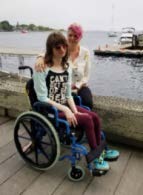BY DANA YARBROUGH
Congress passed the Higher Education Opportunity Act in 2008 to open access for students with intellectual or developmental disabilities (I/DD) to two and four-year college campuses. A national resource center on inclusive college options for people with I/DD, called Think College, estimates that today, there are more than 275 college programs in the United States for transition-aged youth with I/DD ( thinkcollege.net/college-search).
Even with all of these programs and the increasing expectations that young people with I/DD can and should be given the choice to participate in some type of college programming, setting college as a goal in special education planning meetings is still not routinely happening. As the parent myself of a transition aged student with I/DD, I wanted to know more about what led parents of students with I/DD who would not receive a standard diploma to push for them, to attend one of these college programs for youth with I/DD. And, what advice these parents would have for teachers, community disability agency staff, college administrators, and for other parents. I sent a short survey to parents of culturally diverse 18- to 22-year-olds with I/DD that attend a two year, comprehensive transition program for students with I/DD (ACE-IT in College at Virginia Commonwealth University in Richmond, Virginia). This is what I learned.
• How did parent expectations for their child with I/DD to go to college grow? When asked what expectations they had for their child after graduation from high school, half of the parents in this survey said that they had specific expectations that their child with I/DD would go to college. But, the majority of the parents said that their son or daughter did not have college listed as a special education Individualized Education program (IEP) goal! So how did they find their way to a comprehensive transition program on a college campus?
• When asked what factors contributed to parent expectations of college, the most frequently reported answers were: 1) their child setting their own goal to go to college, 2) a teacher recommending ACE-IT in College, and 3) hearing about ACE-IT in College program for students with I/DD from a community group or organization.
What follows is their advice for parents, high school teachers, community agency personnel, and college administrators:

EXTRA CREDIT: "Putting earning a certificate or diploma aside, a student participating in a college experience will gain in so many other areas: daily living skills, communication, community integration."
THE IMPORTANCE OF NOT UNDERESTIMATING ABILITIES
People with I/DD bring a lot to our families, our classrooms, our colleges, and our communities. Parents answering this survey seemed to have had an inborn, natural, and positive perspective on their child. They overwhelmingly advised that parents, teachers, and community agency personnel need to avoid underestimating the abilities of youth with I/DD. Regardless of race, culture or income, parents in this survey have high hopes as well as concerns for their child's success. Encouraging children to have "cando" attitudes and communicating the expectation that they can continue learning after high school are important. "Don't underestimate the abilities of your child." "Grow in your child the 'you can do it' spirit." "Your child is capable of more than you think." "Don't dwell on what you think your child cannot do; focus on what they do."
THE IMPORTANCE OF PARENTS BEING CONNECTED TO THE COMMUNITY
Social networks provide important emotional support and educational opportunities for parents of children with I/DD. Through connections to other families of children with disabilities, parents have someone to talk to about the impact of disability on their family. When connected to a family organization or advocacy group, parents learn about disability services and how to advocate for their child's needs.
Many parents in this study credited the biggest influences that led to them supporting their child in applying for ACE-IT in College to: 1) learning about the program themselves (or from their child's teacher) through attending a presentation in the community, or 2) from hearing about it from another parent they knew in the community. "XXX spoke at an [Arc] meeting and shared information about ACE-IT in College." "Actively get involved in special needs organizations."
THE IMPORTANCE OF THE COLLEGE EXPERIENCE
Looking back on our own college experiences, many of us would say that college is more than just academics; it is about developing friendships with peers and professors, meeting new people, and opening our minds to different ideas. Parents in this survey also believe college is good for everyone. They recognized college as a place that helps young people with and without disabilities, to identify career interests, learn skills to get a job, and to mature and grow personally.
"Putting earning a certificate or diploma aside, a student participating in a college experience will gain in so many other areas: daily living skills, communication, community integration." "The college experience can be a wonderful opportunity for growth both personally and educationally." "College gives the opportunity for your child to grow in so many other ways -- socially, emotionally, and in just plain old practical ways of living." Those with disabilities can be successful in college. Parents in this survey noted that students with disabilities were successful in college when they had access to: 1) technology, 2) appropriate supports, and 3) professors who have training on how to teach to different learning styles.
"Students with disabilities may not pass the test, but can still learn the material." Many colleges and universities believe that the diversity of students is important for fulfilling their mission to provide a quality educational experience. We learn from those whose experiences and beliefs are different from our own. The message from parents in this survey is that people with disabilities add to the diversity of their student body and are a benefit to any college.
"The entire community will gain from the diversity that people with disabilities bring to a college campus." What I discovered is that parents in this survey want their transition-aged child with I/DD to have as "normal" a life as possible. Their responses suggest a strong belief in their child and that they see their child's abilities first and foremost. They also highly value lifelong learning; in particular college.
The lack of college being listed on the IEP for almost all of the survey parent's students, as well as their responses to other survey questions hint that perhaps parent expectations grew less from IDEA special education transition processes, and more from their own experiences having attended college and wanting the same experience for their child—even if the child has I/DD. And, the parents pointed to access to information that came from connections they had in the community with other parents and with family organizations, such as a Parent to Parent program or an Arc chapter, as a key way for growing their expectations for college for their child with I/DD.
Is the reason for a lack of college goals on IEPs because parents and teachers don't know about college opportunities in their community or state? Is it because of a concern by IEP teams that if college is listed as a goal, they are responsible to ensure it happens? I don't know—but I do know that it is important get the discussion of college back at the IEP table. To help with this, parents in this survey recommend:
- • Information on college programs for students with I/DD is shared by colleges and universities with local school divisions;
- • Teachers, transition specialists, and guidance counselors be trained on college opportunities for students with I/DD;
- • Discussions at IEP meetings of the expectation of college as a transition outcome begin as early as when the child is in elementary school;
- • Parents get connected to family organizations in the community for emotional, informational and systems navigational support. •

ABOUT THE AUTHOR: Dana Yarbrough is the mother of Brooke, her 25-year old daughter who, despite physical, intellectual and sensory disabilities, owns her own dog boarding business. Dana is the assistant director at the Partnership for People with Disabilities, Virginia's university center for excellence in developmental disabilities located at Virginia Commonwealth University. One of her primarily roles is to direct the Center for Family Involvement. She can be reached at dvyarbrough@vcu.edu or centerforfamilyinvolvement.org